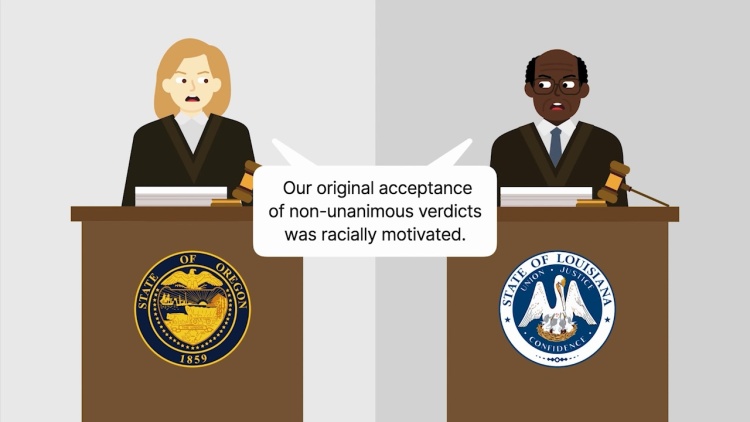Ramos v. Louisiana
United States Supreme Court
140 S. Ct. 1390 (2020)
- Written by Sara Adams, JD
Facts
Unanimous jury verdicts were required in almost every state in the United States as well as in the federal justice system. Only Louisiana and Oregon permitted convictions based on nonunanimous jury votes. Courts in both states admitted that the original acceptance of nonunanimous jury verdicts was racially motivated. Evangelisto Ramos (defendant) was charged with a serious crime in Louisiana state court. Ramos asserted his innocence and chose to proceed with a jury trial. Ten jurors voted to convict Ramos, and two voted to acquit. Because Louisiana law required only that 10 jurors agree to sustain a conviction, Ramos was found guilty. Ramos appealed. The court of appeals affirmed Ramos’s conviction. Ramos petitioned the United States Supreme Court for a writ of certiorari, which the Supreme Court granted.
Rule of Law
Issue
Holding and Reasoning (Gorsuch, J.)
Concurrence (Sotomayor, J.)
Concurrence (Kavanaugh, J.)
Concurrence (Thomas, J.)
Dissent (Alito, J.)
What to do next…
Here's why 907,000 law students have relied on our case briefs:
- Written by law professors and practitioners, not other law students. 47,100 briefs, keyed to 996 casebooks. Top-notch customer support.
- The right amount of information, includes the facts, issues, rule of law, holding and reasoning, and any concurrences and dissents.
- Access in your classes, works on your mobile and tablet. Massive library of related video lessons and high quality multiple-choice questions.
- Easy to use, uniform format for every case brief. Written in plain English, not in legalese. Our briefs summarize and simplify; they don’t just repeat the court’s language.





